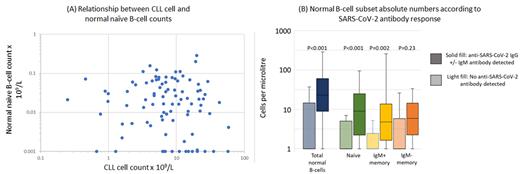Abstract
Background: Infectious morbidity and mortality are an issue in early stage CLL and to a lesser extent in CLL-type MBL. Normal B-cell numbers are usually decreased but the extent of depletion varies and cannot be predicted from the total B-cell count.
Aim: to determine if high-sensitivity analysis of residual normal B-cell subsets can identify individuals with CLL/MBL at increased risk of sub-optimal humoral response to infection/vaccination
Methods:Patients: n=92 (55 male, 37 female), median age 75 years (range 46-93), of which 77 had a diagnosis of CLL/SLL with a median B-cell count of 9.6, range 0.7-59 x 10^9/L, and 15 had MBL with a B-cell count median 3.2, range 0.3-7.1 x 10^9/L (2 had fluctuating B-cell counts that did not persist above 5 x 10^9/L). Samples were collected for routine monitoring and additional analysis was performed on pseudonymised surplus material (REC 14/WS/0098). Full vaccination status is currently evaluable in 69/92.
Flow cytometry: Analysis of normal B-cell subsets was performed using CD19 to identify B-cells, with CD20, CD5, CD79b, ROR1 & CD3 to exclude CLL & contaminating cells, and CD27, CD38, IgD and IgM to characterise normal B-cell subsets; 0.5-2million cells labelled cells were acquired using a Coulter Cytoflex LX.
SARS-CoV-2 antibody response: IgG and IgM antibodies to the spike protein were detected in plasma separated from EDTA-anticoagulated blood using the Fortress diagnostics lateral flow immunoassay validated for the UK REACT-2 national immunosurveillance study.
Results: IgG anti-SARS-Cov-2 antibody response was detected in 67/77 (87%) of people with untreated CLL (of which 38/67 also had IgM Ab) and in 14/15 (93%) of MBL (of which 11/14 also had detectable IgM Ab). The most recent vaccination was a median 5.1 months prior to assessment (range 1.3-11 months, 29% had received 2x BNT162b2, 30% 2x ChAdOx1, 22% 2x ChAdOx1 + 1x BNT162b2, 16% 3x BNT162b2 and 3% declined vaccination).
Figure 1A shows the relationship between CLL-phenotype cell count and normal naive B-cell number for all patients. Total B-cell numbers, as well as naïve-B-cell and IgM+ memory B-cell numbers were significantly reduced in individuals with no IgG SARS-CoV-2 Ab response. The numbers of class-switched memory B-cell numbers were decreased but not significantly different (Figure 1B). There was no clear threshold in any B-cell subset that predicted a detectable SARS-CoV-2 antibody response in CLL/MBL, although 63/66 (95%) of people with a naïve B-cell count >=2/uL had a detectable IgG SARS-CoV-2 Ab response compared to 18/26 (69%) for those with <2/uL naïve B-cells.
Of the 26 people with CLL/MBL and a naïve B-cell count <2/uL, none of the 18 with a detectable IgG SARS-CoV-2 Ab response have died on follow-up (median 9 months, range 5-12) while 3/8 with no IgG SARS-CoV-2 IgG Ab response have subsequently died at 2,3, and 6 months since assessment, all with COVID infection as a primary cause (CLL cell count at last assessment 0.7, 15, and 20 x 10^9/L respectively).
Conclusions: SARS-CoV-2 antibody responses are impaired in a small proportion of people with untreated CLL or MBL who also have substantially depleted naïve/IgM memory B-cells. Measuring normal B-cell levels in people with CLL/MBL is technically challenging and may not be required if COVID vaccine response can be shown to be an effective surrogate for infectious risk in general. Alternative strategies such as the use of passive immunisation or early treatment of active Covid infection with neutralising antibodies or antivirals should be considered in CLL/MBL patient with poor response to vaccination.
Disclosures
Rawstron:Abbvie: Honoraria, Research Funding; BD Biosciences: Honoraria, Patents & Royalties, Research Funding; Beckman Coulter: Honoraria, Research Funding; Beigene: Honoraria, Research Funding; Janssen: Honoraria, Research Funding; Pharmacyclics: Honoraria, Research Funding. Munir:Janssen, AstraZeneca, Alexion, Abbvie, Novartis, Roche: Membership on an entity's Board of Directors or advisory committees; Janssen, AstraZeneca, Alexion, Sobi, Novartis, Roche, Abbvie, Gilead: Honoraria. Hillmen:Janssen: Honoraria, Research Funding; Abbvie: Honoraria, Research Funding; Pharmacyclics: Honoraria, Research Funding; Roche: Research Funding; Gilead: Research Funding; SOBI: Honoraria; Beigene: Honoraria; Astra Zeneca: Honoraria; Apellis Pharmaceuticals: Current Employment.
Author notes
Asterisk with author names denotes non-ASH members.


This feature is available to Subscribers Only
Sign In or Create an Account Close Modal